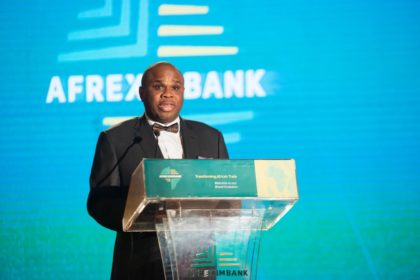The African Export-Import Bank (Afreximbank) on 12 May 2018 in Cairo hosted guests to its inaugural Founders’ Day event held to commemorate the signing of the Bank’s Establishment Agreement which took place in Abidjan on 8 May 1993.
The event, which will be held annually, also marked the Bank’s 25th Anniversary and attracted more than 400 guests comprising Bank staff, government representatives, members of the diplomatic corps, business leaders and other stakeholders from Egypt, the rest of Africa and beyond.
The event paid tribute to the founders of the Bank, including its former Presidents, and recognized the visionary economic leadership that was instrumental to the creation and development of the Bank.
It featured tributes to personalities like the late Dr. Babacar Ndiaye, who, as President of the African Development Bank (AfDB), conceived the idea of establishing a trade finance bank for Africa; Pierre Claver Damiba, who was Director of UNDP’s Regional Bureau for Africa, the institution that funded the feasibility study to create the Bank; and Christopher Edordu, who was the Bank’s pioneer President, along with all pioneer staff. Jean-Louis Ekra, who took over from Mr. Edordu as second President of the Bank, was also featured.
Highlights of the event included a keynote address of Dr. Benedict Oramah, President of the Bank, in which he paid tribute to the founders and pioneer staff and touched on the institution’s major achievements in the delivery of its mandate of transforming Africa’s trade.
He mentioned the innovative initiatives launched by the Bank, including specialised products and programmes customised to suit the needs of continent’s industries and stakeholders, the growth of the balance sheet, the development and diversification of the shareholder base and other key milestones.
Dr. Oramah recalled that the idea of establishing a continental trade finance bank was adopted by African Ministers of Finance in 1987 in Cairo while they were attending the Annual Meeting of the Board of Governors of the AfDB. That period had been marked by a global economic environment that was unfavorable to Africa’s economic growth and development aspirations as the global economy, from the late 1970s to the mid-80s, was undergoing significant deceleration triggered by the declining growth rate of OECD economies and there was considerable downward movement in commodity prices and rising balance of payments crises in developing countries. Afreximbank was, therefore, created to address the challenges that emerged from those economic shocks and to fill the financing vacuum created by the departure of many international banks from the continent.
Afreximbank, which currently has 49 Member States, started out with a limited number of pioneer shareholders, namely, the Governments of Egypt, Nigeria, Côte d’Ivoire, and Zimbabwe, which provided the necessary impetus for its establishment. Countries, such as Senegal and Tunisia, and corporate entities, like Standard Chartered Bank, Exim India and US-based Pryor McClendon and Co, also played a critical role at the conception stage by providing support and/or releasing their staff members to participate in various start-up activities.
The celebration included a panel discussion by Hassab El Rasoul El Obeid, Legal Advisor at the Arab Fund for Economic and Social Development, and Dr. Adesegun Akin-Olugbade, Executive Director and General Counsel of the Africa Finance Corporation, on the events leading to the negotiation and signing of the Establishment Agreement and Charter in Abidjan. The two lawyers, who were employees of the AfDB at the time, drafted and negotiated the Bank’s Establishment Agreement and Charter. The session was moderated by Dr. George Elombi, Executive Vice-President for Governance, Corporate and Legal Services at Afreximbank.
The ceremony concluded with the presentation of Employee Long Service Awards to several staff members. Gold awards were presented to those who have been at the institution for more than 20 years, silver awards to those with 15 years of service and bronze awards to staff members who have served for 10 years.

